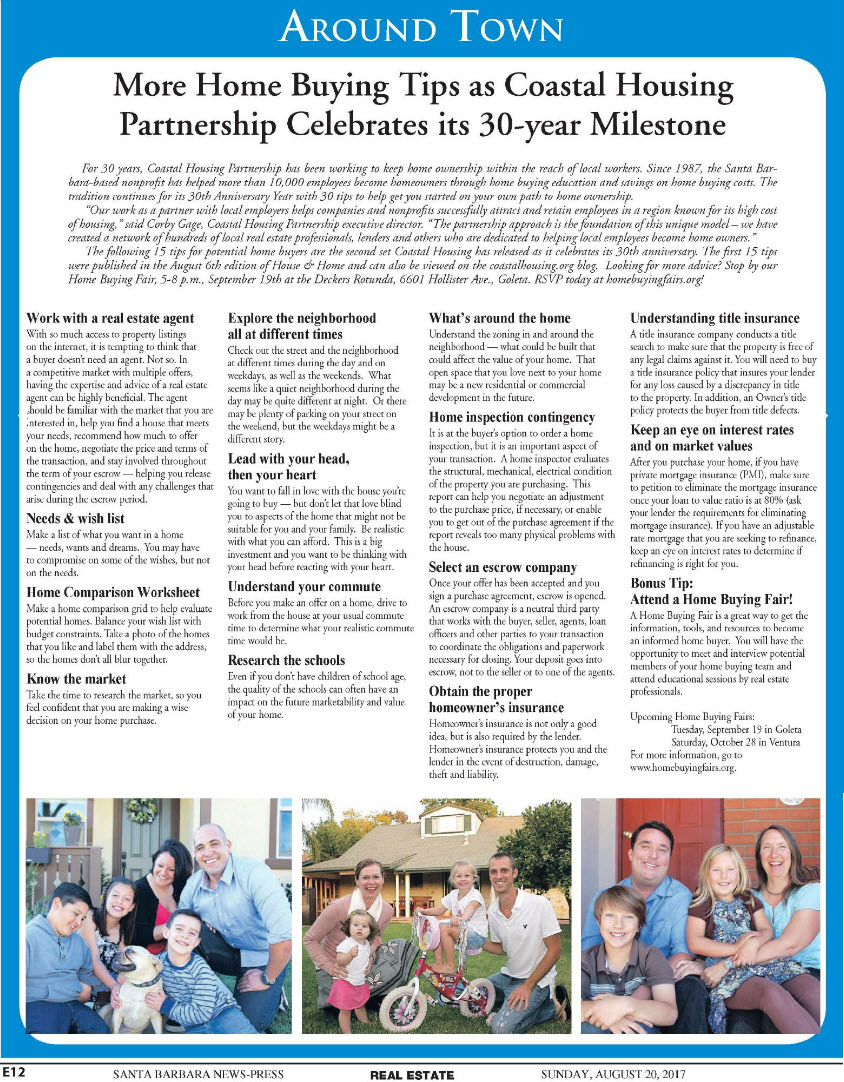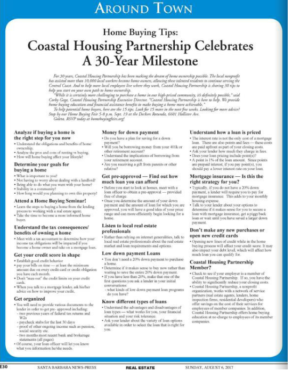30 Home Buying Tips for 30 Years, Part 2
For 30 years, Coastal Housing Partnership has been working to keep home ownership within the reach of local workers. Since 1987, the Santa Barbara-based nonprofit has helped more than 10,000 employees become homeowners through home buying education and savings on home buying costs. The tradition continues for its 30th Anniversary Year with 30 tips to help get you started on your own path to home ownership.

Published in Santa Barbara News-Press House & Home!
“Our work as a partner with local employers helps companies and nonprofits successfully attract and retain employees in a region known for its high cost of housing,” said Corby Gage, Coastal Housing Partnership executive director. “The partnership approach is the foundation of this unique model – we have created a network of hundreds of local real estate professionals, lenders and others who are dedicated to helping local employees become home owners.”
The following 15 tips for potential home buyers are the second set Coastal Housing has released as it celebrates its 30th anniversary. The first 15 tips were published in the August 6th edition of House & Home and can also be viewed below on the coastalhousing.org blog. Looking for more advice? Stop by our Home Buying Fair, 5-8 p.m., September 19th at the Deckers Rotunda, 6601 Hollister Ave., Goleta. RSVP today at homebuyingfairs.org!
Part Two
-
- Work with a real estate agent
With so much access to property listings on the internet, it is tempting to think that a buyer doesn’t need an agent. Not so. In a competitive market with multiple offers, having the expertise and advice of a real estate agent can be highly beneficial. The agent should be familiar with the market that you are interested in, help you find a house that meets your needs, recommend how much to offer on the home, negotiate the price and terms of the transaction, and stay involved throughout the term of your escrow – helping you release contingencies and deal with any challenges that arise during the escrow period. - Needs & wish list
Make a list of what you want in a home – needs, wants and dreams. You may have to compromise on some of the wishes, but not on the needs. - Home Comparison Worksheet
Make a home comparison grid to help evaluate potential homes.
Balance your wish list with budget constraints. Take a photo of the homes that you like and label them with the address, so the homes don’t all blur together. - Know the market
Take the time to research the market, so you feel confident that you are making a wise decision on your home purchase. - Explore the neighborhood at all different times
Check out the street and the neighborhood at different times during the day and on weekdays, as well as the weekends. What seems like a quiet neighborhood during the day may be quite different at night. Or there may be plenty of parking on your street on the weekend, but the weekdays might be a different story. - Lead with your head, then your heart
You want to fall in love with the house you’re going to buy – but don’t let that love blind you to aspects of the home that might not be suitable for you and your family. Be realistic with what you can afford. This is a big investment and you want to be thinking with your head before reacting with your heart. - Understand your commute
Before you make an offer on a home, drive to work from the house at your usual commute time to determine what your realistic commute time would be. - Research the schools
Even if you don’t have children of school age, the quality of the schools can often have an impact on the future marketability and value of your home. - What’s around the home
Understand the zoning in and around the neighborhood – what could be built that could affect the value of your home. That open space that you love next to your home may be a new residential or commercial development in the future. - Home inspection contingency
It is at the buyer’s option to order a home inspection, but it is an important aspect of your transaction. A home inspector evaluates the structural, mechanical, electrical condition of the property you are purchasing. This report can help you negotiate an adjustment to the purchase price, if necessary, or enable you to get out of the purchase agreement if the report reveals too many physical problems with the house. - Select an escrow company
Once your offer has been accepted and you sign a purchase agreement, escrow is opened. An escrow company is a neutral third party that works with the buyer, seller, agents, loan officers and other parties to your transaction to coordinate the obligations and paperwork necessary for closing. Your deposit goes into escrow, not to the seller or to one of the agents. - Understanding title insurance
A title insurance company conducts a title search to make sure that the property is free of any legal claims against it. You will need to buy a title insurance policy that insures your lender for any loss caused by a discrepancy in title to the property. In addition, an Owner’s title policy protects the buyer from title defects. - Obtain the proper home owner’s insurance
Home owner’s insurance is not only a good idea, but is also required by the lender. Home owner’s insurance protects you and the lender in the event of destruction, damage, theft and liability. - Keep an eye on interest rates and on market values
After you purchase your home, if you have private mortgage insurance (PMI), make sure to petition to eliminate the mortgage insurance once your loan to value ratio is at 80% (ask your lender the requirements for eliminating mortgage insurance). If you have an adjustable rate mortgage that you are seeking to refinance, keep an eye on interest rates to determine if refinancing is right for you. - Attend a Home Buying Fair!
A Home Buying Fair is a great way to get the information, tools, and resources to become an informed home buyer. You will have the opportunity to meet and interview potential members of your home buying team and attend educational sessions by real estate professionals.
Upcoming Home Buying Fairs:
Tuesday, September 19 in Goleta
Saturday, October 28 in Ventura
For more information, go to www.homebuyingfairs.org. - Work with a real estate agent
